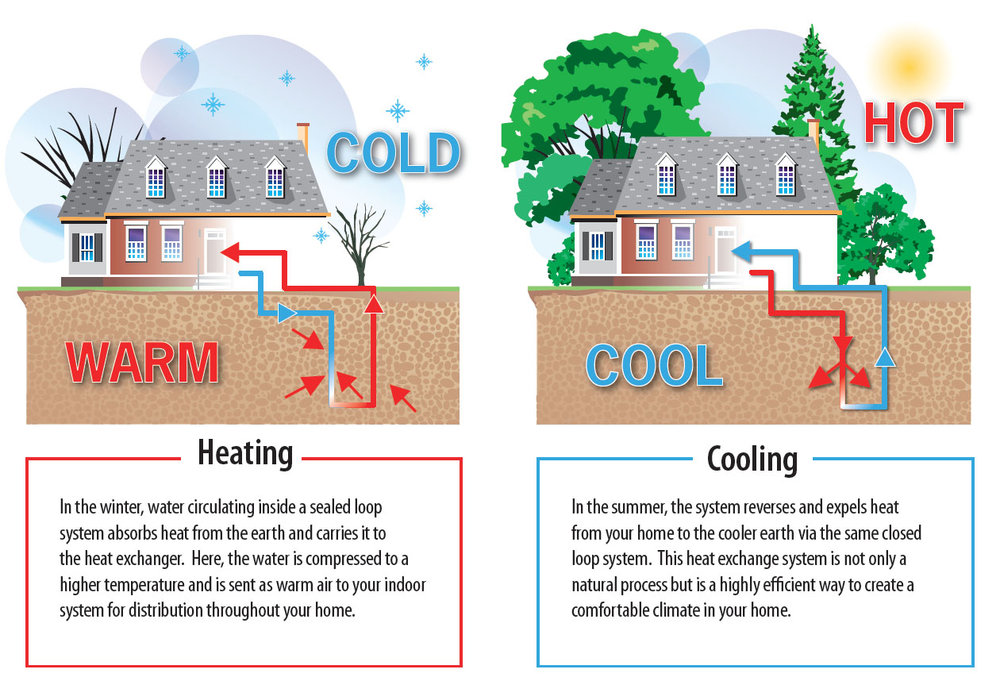What is Geothermal Heating and Cooling?

The main difference between residential geothermal system and a traditional air-source HVAC system is that it uses the Earth’s geothermal energy instead of relying on fuel to produce heat.
With a geothermal heating and cooling system, a heat pump located inside your home circulates fluid through a pipe loop that is buried below ground, where the ground temperature stays at 50-60 degrees.
The geothermal technology then uses the available heat from the ground during cold weather months, and puts that heat back in the ground during the warm weather months.
What Are the Components of a Geothermal Heating & Cooling System?
There are three primary components in a geothermal cooling system:
- A horizontal loop or vertical “loop field” (the heat exchang)
- A water-source heat pump
- The delivery system (ductwork)
The ground loop field consists of underground pipes that are buried below the frost line, where the temperature of the ground stays constant. A fluid (usually water or a mixture of water and glycol) circulates through the pipes, absorbing or relinquishing heat.
Depending on the space available and layout of your property, the pipes are either installed vertically or horizontally.
In the winter the geothermal heat pump removes heat from the heat exchanger and pumps it into the ductwork, and in the summer the heat pump moves heat into the heat exchanger.
Because the system always has a relatively consistent starting point, the amount of energy needed to raise or lower the temperature is reduced.
Why Should You Choose a Geothermal HVAC?
The benefits of a geothermal heating and cooling system are numerous. Geothermal units are:
- Quieter
- More efficient
- Longer lasting
- Have lower maintenance costs, and
- Better for the environment
A geothermal cooling system is quieter than a traditional HVAC unit because most of the system is outdoors, and the geothermal heat pump—which is indoors—is barely audible.
A geothermal HVAC is more efficient because than a traditional hvac system because it uses the Earth’s energy and transfers heat instead of burning fuel.
“Depending on factors such as climate, soil conditions, the system you choose, and available financing and incentives, you may recoup your investment in two to ten years through lower utility bills,” according to energy.gov.
Geothermal HVAC systems also last longer than traditional HVAC systems because there are fewer moving parts. And maintenance costs are typically lower because the heat pump is inside, as opposed to the unit being outside where it is exposed to the elements.
Geothermal heat pumps are also better for the environment because they use less energy.
Special financing offers and incentives (like tax credits) may be available to those who choose to install a new geothermal HVAC.
Geothermal Heat Pumps Save You Money
How much can you save on your monthly utility bills by utilizing a geothermal heat pump?
According to the Environmental Protection Agency, “geothermal heat pumps can reduce energy consumption—and corresponding emissions—up to 44% compared with air-source heat pumps and up to 72% compared with electric resistance heating with standard air conditioning equipment.
Geothermal heat pumps also improve humidity control by maintaining about 50% relative indoor humidity, making them very effective in humid areas.” Like Nashville in the spring and summer.
Are Geothermal Heat Pumps Good for Nashville?
Geothermal heating and cooling can help keep you comfortable year round while dramatically reducing your utility bills. A geothermal HVAC system is also quieter, environmentally-friendly, and typically lasts longer than a traditional HVAC unit.
Tax credits and other incentives may be available to those who wish to take advantage of the benefits that geothermal heat pumps provide.
Nashville Geothermal HVAC Installation
Installing a geothermal HVAC system is a complex job, so it’s imperative that you retain a reputable, licensed HVAC contractor with extensive experience installing geothermal heating and cooling solutions.
Your HVAC contractor’s expertise will help to:
- Size the system
- Choose the type of pipe loop (vertical, horizontal or pond*)
- Dig, excavate and backfill (to install the necessary pipes)
* With a pond loop the pipes sit near the bottom of a pond or lake instead of underground. The system works the same way as a ground system because the temperature at the bottom of a pond or lake is fairly consistent, just as it is underground. If you have a lake or pond on your property, a pond loop is a distinct possibility.
Nashville Geothermal HVAC Maintenance and Service
Once your new geothermal HVAC system has been installed it will need maintenance and service, though repairs are likely to be less frequent and less expensive than those associated with traditional HVAC.
Scheduling regular maintenance—we recommend utilizing Jewell Mechanical’s annual Energy Savings Agreement (ESA)—makes it easy to be sure your geothermal HVAC gets the maintenance it needs to remain at peak performance.
Our ESA includes a maintenance plan of two services per year, as well as many other benefits, including priority customer status and discounts on repairs.
Call Jewell Mechanical for your Geothermal Installation
Whether you looking to install a new geothermal HVAC, need routine maintenance, or looking for an HVAC contractor to service your existing geothermal cooling solution, Jewell Mechanical should be your first call. Our friendly, experienced technicians are committed to ensuring your complete satisfaction and comfort.
